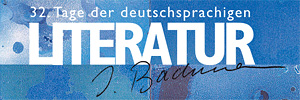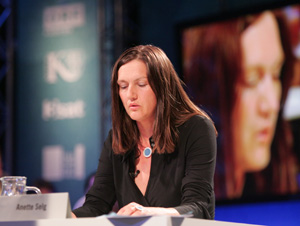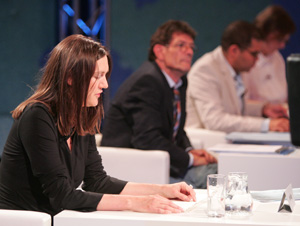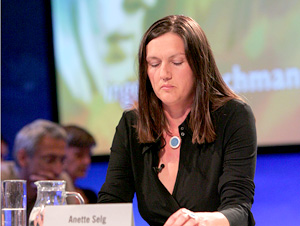Anette Selg, Vorpommern/Berlin (D)
Anette Selg was born in Tuttlingen in 1968 and lives in Western Pomerania and Berlin. Selg was suggested as Klaus Nüchtern's competition sponsor.
Download text in:
Word file format (*.doc)
PDF file format (*.pdf)
Information on the author
Videoportrait

Anette Selg
Motherfatherchild
© 2007
The woman waits in the darkened room, until the child has gone to sleep. He's lying beside the man in the big bed, in two hours he will wake up with red cheeks and sweaty hair, and then all three will go to the restaurant at the front, which belongs to the white bungalows, drink afternoon coffee and the boy will have an ice cream. The woman takes her book and a sheet from the parapet in front of the entrance and walks down the narrow outside stairs. A vast blue glows above her head as on the previous afternoons, except on the day of their arrival, on which everything was grey with rain. There's not a sound from the apartment on the ground floor, the two children are asleep and their parents probably are too. Children's bathing suits, sun hats, a pair of big black bathing trunks, which belong to the twins' father, are drying on a washing line in front of the closed blinds.
The woman follows the flagstone path through the burnt grass, past the blue painted oil drum for the refuse, the tattered palm, as far as the olive bushes, larks, hedges with leathery leaves, which separate the little settlement from the beach. A couple of days ago she discovered a hollow space in the bushes, a sleeping place carpeted with old raffia mats, broken airbeds. With the things which stay on the island, when the tourists leave again. By the water she lies down under a sunshade, one side of which droops like a broken wing, closes her eyes, and thinks that these afternoon hours belong to her as nothing has for a long time. Feels the warm sand under her arms and legs, places one hand on her stomach and reads in her book about a woman painter in Paris, who lives with two men in a house and then leaves them in the end. Perhaps loneliness is the only possible place, she writes in a letter to a third man. And the woman thinks of her Berlin living room bed room child's room, of her desk in the open plan editorial office, and to have a loneliness of her own at her disposal seems like infinite luxury. At the end of the story she sees Theo, the father of the twins, appearing to the left of her book and then to the right. She follows him with her eyes as he bends down and lifts something out of the shallow water, mussels, stones, she can't make it out.

In the evening red green pale brown sea urchin shells are lying on the restaurant table the two families share. In among them carafes of water, plates with cold chips, lamb bones, little ouzo bottles with narrow necks. The boy sits between the twins, for whom he has only one name: Tildafrieda. Two brown heads and a blond one, and Theo raises his glass and they drink to the Greek island, on which they have got to know each other, even though they live only a few streets apart in Berlin. Drink to their island, a rock in the water with a fishing village and a locked church on a hill. Next to the place where the steamer berths, blue and red painted fishing boats bob up and down, on the bay behind that the settlement with the white bungalows. Cat, says the boy and slips from his chair, in order to approach the little striped thing, which evades him with a leap onto the restaurant wall and runs down the short slope to the beach and the water. The boy slowly returns to the table. Bed time, says his father and lets the child clamber on his back, Theo's wife packs the twins into the cart, and together they disappear into the night.
The woman runs after them, gives the boy a good night kiss, then returns to Theo still sitting at the table. They look at the sea and through the open restaurant roof at an impenetrable starry sky, only on the first evening was there a tarpaulin over the opening. Sit there without talking, happy that at last there's peace and quiet. When the woman feels their arms touching, she moves a little to the side with her chair. At some point the old man from the next table joins them, a hippy grown grey with dignity, loose clothes, full beard, head of disorderly curls. Her husband calls him the philosopher. He lives alone in one of the bungalows and only comes to the beach in the late afternoon with his camera. Adonis, that's how he had introduced himself on the first evening. They talk to him in English, he replies slowly, searching for words, strokes his grey beard as he does so, as if he were stroking an animal, and tops up their glasses with grappa from a clear plastic bottle. From the Greek mountains, he says. When the woman walks back to the bungalows with Theo, she stumbles on the crudely cut slabs, which lie everywhere on the paths, and she grips him for a moment, so as not to fall.
The next morning she hears the voices of the twins outside the door. Her husband is still sleeping, she pulls the sheet over his naked back. The child is lying in a corner of the cot, his face snuggled into his arms, and as she goes closer to him, he opens his eyes for a moment, he has her eyes, green with brown, then he goes on sleeping, and she goes out of the room in t-shirt and panties. She sits down on the wooden stool beside the door and lays her head on the white parapet. On the horizon the sea, much bluer even than the sky. The twins are playing on the grass below her and painting each other with water-paints. She sees Theo a little distance away, bent over his yard-long sailing boat, which he has been working on since the day of their arrival, whose body he has woven out of twigs, covered with papier-maché and later with cloth remnants. He must have created a forbidden zone around himself, which the girls don't dare to enter, while he paints the keel and the hull in the glowing pale blue of the doors and windows all around them. When he meets her gaze, he briefly raises his blue hand and she points to a big boat on the horizon. Then she goes back to her room, pulls off her t-shirt and nestles up to the sleeping man, places her arm around his stomach, so that there's no more air between them, and listens to his breathing and that of the child.
On the beach in the afternoon she continues reading and thinks, there are no bodies in the stories, no skin, no hands, and certainly none that find each other, only incomprehensible longings, which run down Parisian streets or wait, in dark rooms, bars and parks. Later she walks across the deserted beach into the water and as she's swimming back sees Theo sitting by the shore, making attempts to keep the boat on an even keel, putting big stones, one after the other, into the shop's innards, and he only briefly raises his head as she walks past him, but she feels his gaze until she's lying on her towel again. The yearning people in the book do everything they can, in order to go on yearning, spend days alone in bed, lie awake at night, call each other and write letters and then put the phone down, without saying anything, or don't send their letters. The deaths they die are familiar to her from an earlier life. Now she dies other deaths: An inflated child's t-shirt, drifting on the surface of the water. The boy's wide open eyes. His sobbing as she squeezes him to her breast, carries him ashore.
When the woman wakes up, Theo is lying a few yards away from her in the shadow of another sunshade. Then she hears voices and sees Theo's wife with the twins coming to the beach, they build a fortress around him with water wings, pails and inflatable animals. Love must be spoken, reads the woman and remembers her first days with the child, who had brought his own world with him, in which her language counted for nothing. How she hummed a tune for the alien being, because her words were useless for this love. And then her husband and the boy race out of the bushes and throw themselves on her, and not until she walks back to the bungalows from the restaurant with Theo and the exhausted children under a star-white sky and she then goes upstairs with the boy in her arms and puts him to bed and doesn't leave the room until everything below her is quiet, not until then does she remember them again, the lovers like drowning men and women in the stories. Stands on the grey lawn and looks at the sky, and when Theo leaves the apartment, they walk close together to the beach, walk hand in hand without knowing how and don't let go of each other until they reach the cone of light of the restaurant.

The other two are talking to Adonis who is leaning over to them from the next table. They look like a couple thinks the woman, and when she and Theo sit down, the old man draws his chair up and pulls a little plastic book from his belt bag, a well-thumbed album, naked women in all the photos, lying in the shallow water or sitting on a rock or on the sand. Faceless bodies, since all of them are turning their face away from the photographer. Did he sleep with them beforehand or afterwards or at all, wonders the woman, is that what he wants to tell them with his collection, and doesn't say anything about the pictures, which to go by the colours are certainly ten or fifteen years old. This evening he doesn't stay, merely places his half full plastic bottle beside the water carafes, puts his album back in his bag and takes his leave. After that the four of them sit at the table, and they drink to each other with the spirit they've been given, smoke Greek cigarettes, and Theo's wife talks about her grandmother, to whom a whole castle garden full of roses belonged somewhere in southern Germany, and how as a child she walked all afternoon between the radiant flower beds and in the evening she was as if intoxicated by the scent. Theo's wife has short light brown hair like Jean Seberg's in Breathless, which she pushes into her face as she's talking, with a gesture that could also come from the film. Is a small, slender woman with regular features and straight teeth. Her family had at some point broken off contact with her grandmother, says Theo's wife, and since then she had never been in the garden again. Except we invited her to the wedding. Didn't say a word to my father and only the bare minimum to me, but she liked Theo. She took a fancy to him from the start. Theo says nothing, and the woman thinks, that she has always envied those people, who do nothing and are loved nevertheless. She looks over to her husband, who is sitting on his chair with his arms folded behind his head, thinks, that they both have it not too easy and not too hard and perhaps that goes together quite well. Sometimes, when she wakes up in the night, she strokes the inside of his arms and sinks into their softness and glides back into sleep and dreams. This gentleness exists and a delight, when they sleep with one another, but desire, she thinks, like hunger and despair? Yawns and is too tired to put her hand in front of her mouth, Good night all, and as she gets up, Theo says: I'm going too, and also leaves the restaurant, in which only their table is still occupied and a small one by the wall, at which two men from the village are sitting, discussing something with the landlord and with his wife. She has her sleeping boy in her lap, who has the blond curly hair of the cook and his pale skin.
In passing the woman glances in the mirror hanging outside the toilets, sees two dark shadows and hears their footsteps as one. She never walks in such harmony with her husband. They walk hand in hand once they reach the unlit part of the path. It's a simple togetherness, as with a child. And so they kiss when they reach the bungalow, a yellow triangular sail, cut from a curtain, is hanging on the washing line. And so the woman goes upstairs, and when she wakes up in the night, because the child is sighing loudly in his sleep, her husband is not back yet, not until morning does he lie down beside her and hugs her to him, when she wants to get out of bed, and pushes one leg between her thighs and pulls off her panties with his foot, and as every time she thinks, he got that from me, and no longer remember s whom she copied it from.

That morning they decide to make an excursion across the island mountain to a restaurant on the other side. Like curious butterflies, thinks the woman, as on the descent she sees the girls and Theo's wife in front of her, hopping along the narrow track in white skirts and track suit tops and crocheted hats. On the mountain top there are small bushes growing, which lie in the rocky landscape like porcupines. From time to time the woman catches a pungent smell, as when one stands too close to a stranger on the underground. Electronic music is playing in the cafe, dark wooden tables stand under a palm roof, the floor is covered in white pebbles. They order noodles with tomato sauce for the children and meze and ouzo, talk about clubs and record labels and trainers and Ray-Bans. After the meal they watch the children, who are chasing the cats and hiding in earthenware amphoras, which are lying everywhere on the sand. And they all drink more coffee and ouzo and go on smoking their Greek cigarettes and from the loudspeaker comes Killing Me Softly and Theo's wife talks about the concert in the Metropol, surrounded by pubescent girls, and Theo groans: Lauryn Hill, and then he gives her a long kiss on her pale brown forehead and she lays her head on his chest. And the woman puts her legs on the chair beside her and leans against her husband and says, I always liked that, when they all fall asleep in Sleeping Beauty, and I wondered, when I was little, if everyone else is sleeping, when I'm sleeping.
They don't awaken from their enchantment any more all afternoon, push the cart with the sleeping children back over the mountain, walk through the abandoned greygreen landscape like extra-terrestrials with their sunglasses, baseball caps, shoulder bags and track suit bottoms. In the distance they can make out the last Greek islands off the Turkish coast. Their view is intersected by the thick black power cable which, balancing on wooden masts, encloses the island. Back at their beach they all throw themselves on the sand and the children play in the thicket of bushes, and not until the sun goes down, and the woman has never before seen the sun disappear in the sea like this, so red and glittering and so aglow in its last moments, not until then, when the sun has disappeared, does she see the shadows in their faces, and the twins start to fight, and the boy cries and says: tummy ache.
That evening the woman senses the togetherness with Theo, senses, that it is arousing expectations, that their obscure juxtaposition is taking on contures, wants to distinguish itself from other affiliations. And she responds irritably to her restlessness and to the boy, when he spills the full bottle of lemonade over her blouse, and doesn't let anyone at all placate her and takes the children home with Theo's wife and afterwards doesn't go back to the restaurant. In her dream Theo is standing at the door of the Berlin apartment and asking her for an envelope for a big rolled-up photo, which she is jealous of because he's holding it so carefully, and she can't find anything suitable and returns to him with empty hands. When she wakes up she goes to the bathroom and drinks a glass of water. Then she leaves the room, sits down on the stool at the door and watches as the sky slowly brightens. Thinks of the glowing sun, which set in the sea and is now rising again behind the mountain. Sees Theo standing below, looking up at her. Together they walk over the flagstones, the stubbly grass to the beach and lie down in the hollow of towels and raffia mats and airbeds. Once the woman opens her eyes and sees a dog running along by the water, an old man following it, then she sinks back into the invisibility that surrounds both of them, feels Theo's strangeness, without it disturbing her, only occasionally stumbles with her hands over unfamiliar bones skin hair. Remains wide awake after that, crisp morning blue penetrates the leaves, swims and dresses again and walks along the beach to the restaurant. The Polish temporary cook makes her a café mocha, and he doesn't make it by stirring powder and hot water like the others, but roasts the coffee in a little pot and then lets it boil up twice on the propane gas ring behind the counter, like the steward of the little steamer on the voyage from the big island to the little ones here. On which her husband was sitting next to Theo's wife and the twins, when she came back with the two cups. The woman drinks the hot coffee and as she leaves looks in the mirror by the toilet doors, sees very dark eyes and a face, in which everything is in its place as it hasn't been for a long time. Walks back over the uneven flagstones and lies down beside her husband and her life closes around her.
On the morning of their departure they all took the seven o'clock ferry to the nearest larger island and there boarded a huge steamer, which took the tourists back to Athens from the fishing villages. The previous afternoon they had clambered onto the flat tongue of rock, which jutted out far into the water in the next bay. Theo carried his sailing boat in both arms and carefully let it slide into the sea from the last stones. It lay first to one side, then to the other, turned slowly in the wind and then set sail, distanced itself from them on a line parallel to the shore, without coming closer to the shore or the horizon. In the evening the old man had sat down at their table again and poured out grappa for them and told them, when they said goodbye, that he spent three months on the island every year and always returned to Athens at the end of September, and then he had taken a little plastic card out of his belt bag, Antonis Finikas it said, next to a passport photo of a man with a trimmed moustache and hair cut short with a neat parting and with stripes and stars on his epaulettes. Me, he said, that is me, and that he worked for the air force in Athens, as a technical officer in air defences, that's what he was otherwise in life, but there was one thing they shouldn't forget, that this was the most beautiful island in the world and they absolutely must come again next summer. And Theo said, that he programmed these systems for an American company, these air defence devices. The Greek air force received a large part of its equipment from the Americans, said the old man. And the two of them talked about technical equipment, model names and code numbers, and to the woman it seemed as they had finally found their very own language.
On the crowded giant steamer they sat next to an Italian married couple. The fat woman, dressed in black linen and with a big wooden necklace around her neck, was copying something from a notepad into a leather bound book with cream-coloured pages. She tore the copied pages from the pad, crumpled them up and dropped them over the railing into the water. The Italian man, in a light brown corduroy suit with the jacket open, had a paperback on the table in front of him, Friedell's Cultural History of Greece, and when he topped up his glass from a plastic bottle of wine, the woman read on the page lying open: Only three nights a year were counted as starless.
She was alone with Theo just once more, in the ladies' toilet of the ship, as she was washing the children's feet in the hand basin, soaping small soft foot soles and toes. She didn't raise her head and didn't want this intimacy reflected, looked at Theo's thin dark arm beside hers, helped him dress the girls again, and thought, that they hadn't exchanged another word since that morning. Then stood for a long time on the upper deck with the child, who couldn't get enough of looking at the white waves the ship drew behind it, felt the little arm around her leg and thought, how only last night she had gone walking along the beach alone and in the bay behind the settlement had discovered Theo's sailing boat leaning against a low quay wall. Someone must have pulled it ashore, picked it out of the water and carried it to the wall. The care with which the boat had been set down, moved her, and that it would spend the night in a safe haven: Yet she would have wished something else for it: Turbulent days on the open sea, before it sank in the end or fell apart and drifted away in all directions.
Translated by Martin Chalmers

